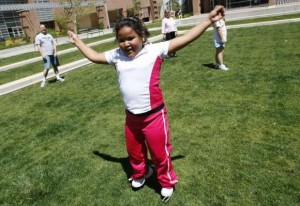By Genevra Pittman

Credit: Reuters/Rick Wilking
NEW YORK Tue Feb 4, 2014 12:06pm EST
(Reuters Health) – Half of parents with an overweight or obese child think their kids are slimmer than they actually are, according to a new review of past studies.
In 69 studies of more than 15,000 children, researchers found many parents with an overweight child thought their son or daughter was at a healthy weight or below. Others with an obese kid thought the child was normal or just a bit heavy.
“We know that parents play a very crucial role in preventing childhood obesity, and interventions are most successful if they involve parents,” said Alyssa Lundahl. She led the study at the University of Nebraska-Lincoln.
But, Lundahl said, if parents don’t recognize their child is overweight or aren’t concerned, they aren’t going to take steps to address it.
“Previous research has found that when parents’ perceptions are corrected, they do start to take action and encourage their children to become more active and maybe turn off the TV and go outside and play,” she told Reuters Health.
The studies included children and teenagers ages two and up. In each case, researchers had parents assess their child’s size using pictures, rating scales or other techniques. Then they measured the children to determine whether they hit weight-to-height cutoffs for being overweight or obese.
Just over half of parents – 51 percent – thought their overweight child was normal or underweight or thought their obese child was normal, underweight or just overweight.
It’s possible parents in the studies wanted to avoid labeling or stigmatizing their child, Lundahl and her colleagues write. Or, their understanding of what an overweight child looks like could be distorted from media reports on childhood obesity showing images of severely obese kids.
The authors did the same analysis looking at 52 studies of about 65,000 normal-weight children. They found 14 percent of those children’s parents also underestimated their kid’s weight, thinking the child was underweight.
Lundahl, whose research is published in Pediatrics, said parents can make sure their child’s pediatrician is checking whether the child is in the normal weight-to-height range.
Conversations about weight can be difficult for both pediatricians and parents, noted Dr. Raquel Hernandez, from All Children’s Hospital in St. Petersburg, Florida and Johns Hopkins University School of Medicine.
“Parents do have to be more open-minded to the conversation of how they feel about their child’s weight,” Hernandez, who wasn’t involved in the new research, told Reuters Health.
“For the motivated parent who is open-minded there may be an issue, there is a real potential to make an impact in young kids,” she said. That’s important because children who are overweight are much more likely to grow up to be obese than their normal-weight peers if they don’t change their habits.
Hernandez recommended parents of overweight children cut down on sugary drinks like juice and be careful with portion sizes.
No matter what size children are, parents should encourage them to eat healthy and be physically active, Lundahl said.
Lynn Brann, a pediatric nutrition researcher at Syracuse University in New York, agreed.
“Parents of children with all body weights can be helped in terms of improving their nutrition and their health,” Brann, who also wasn’t involved in the new research, told Reuters Health.
She said she avoids telling parents to make weight, itself, a big deal with their kids.
“It’s not about weight; it’s about what your body can do and how you fuel it,” she said.
SOURCE: bit.ly/1e0MzTO Pediatrics, online February 3, 2014.








